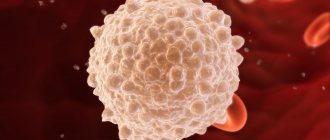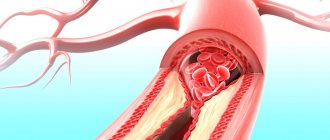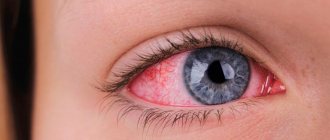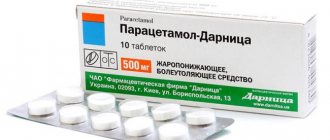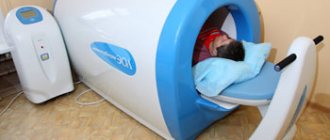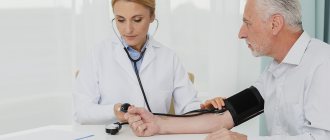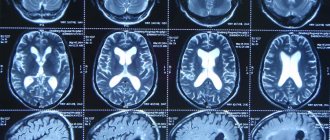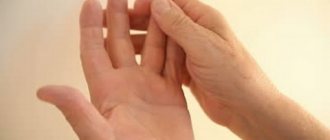Neurosis is a mental disorder in which the patient reacts emotionally to various stress factors. This is a reversible psychogenic disease, which is characterized by asthenic and hysterical, as well as various behavioral destructive manifestations against the background of a decrease in mental and physical performance.
Neuroses tend to have a long and latent (hidden) course, and are quite difficult to diagnose. A person may not immediately detect neurosis in himself, and usually pays attention to his psycho-emotional state only at critical moments (during hysterical attacks, fainting and other psychosomatic and neurogenic symptoms). Relatives of a person suffering from neurosis also cannot always notice this condition, because Neurotic disorders usually occur latently and appear from time to time. Often people suffering from psychoneuroses try to hide their condition, become withdrawn, limit communication and avoid close contacts with others.
Causes of neuroses
The cause of neurosis can be one of the following factors:
- stress and nervous tension;
- negative emotions;
- psychological trauma;
- chronic overwork;
- lack of sleep.
Some experts consider upbringing, a negative environment (especially in childhood), as well as innate properties of temperament and personality to be psychogenic factors of neurosis. Less commonly, neuroses develop against the background of physical head injuries, infectious diseases of the brain, or under the influence of psychotropic substances, drugs and alcohol.
Cardioneurosis
One of the manifestations of dysfunction of the autonomic nervous system is cardioneurosis. This disease does not have an organic basis, but is subjectively felt by patients in the form of increased heartbeat, chest discomfort and insomnia. Diagnosed in 40% of all patients with cardiac complaints. It is more common in young women with a labile psyche.
Causes
Cardioneurosis refers to nosologies with multiple etiologies. Risk factors for the development of the disease are excessive excitability, a tendency to depression or hysterics, and previous diseases of the central nervous system. The reasons that directly cause this condition include:
- mental disorders of the neurotic spectrum (phobias, obsessions, compulsions);
- severe psycho-emotional stress (death of loved ones, natural disasters);
- hormonal disharmony (menopause, pregnancy, puberty, taking COCs, hormone-producing tumor);
- chronic overwork, difficult working conditions (noise, vibration, insolation, changes in temperature and pressure);
- severe intoxication (poisoning, working with heavy metals, alcoholism, caffeine abuse);
- infectious diseases (meningitis, encephalitis, syphilis).
As a rule, no isolated cause can be identified. They act in combination, knocking the body out of balance on several levels at once.
Symptoms
Clinical manifestations are not specific, which makes cardioneurosis an exclusionary diagnosis. The intensity of symptoms depends on the susceptibility of the patient and the condition of his body.
Patients complain of pain without clear localization that occurs after prolonged physical activity or emotional shock. The condition is accompanied by a feeling of fear, anxiety, hyperhidrosis, and is not eliminated by nitrates. Breathing quickens, becomes shallow, and shortness of breath may occur.
Poor peripheral circulation manifests itself in the form of headache, fatigue, coldness of the fingertips against the background of elevated body temperature. The attack occurs at night and ends with excessive urination and upset stool.
Despite the fact that serious consequences should not be expected, over time patients develop hypochondria, phobias progress, and the overall quality of life deteriorates. There is a high probability of developing coronary artery disease or hypertension, various types of arrhythmias. All this increases the risk of myocardial infarction in the future.
Diagnostics
The diagnosis begins with a general practitioner or family doctor. If necessary, the patient is referred to a cardiologist, neurologist, or psychiatrist. Since it is necessary to exclude other causes of heart pain, a comprehensive examination is carried out:
- collecting anamnesis (complaints, presence of similar pathology in first-degree relatives, risk factors);
- physical examination (listening to the heart, determining its size);
- instrumental studies (ECG, ultrasound of the heart);
- laboratory data (ESR level, leukocyte count, acute phase proteins, amount of troponin, myoglobin and other markers of infarction).
The diagnosis requires clarification of such criteria as the duration of the attack, the presence of a psycho-emotional component, and the absence of organic lesions.
Treatment
The cardiologist, together with the psychiatrist, prescribes etiological and symptomatic therapy. It includes:
- psychotherapy (hypnosis, relaxation, behavior correction);
- medications (sedatives, antibiotics, multivitamins, hormones);
- physiotherapy (reflexotherapy, electrosleep, hydromassage, electrophoresis).
Prevention involves lifestyle changes, diet, giving up bad habits, and physical exercise.
Signs and symptoms
Common signs of neurosis include:
- constant feeling of fatigue;
- indecision in decision making;
- irritability;
- increased sensitivity to external stimuli (light, sounds, smells);
- sleep disturbances, dizziness, headaches;
- dyspeptic disorders;
- problems in the intimate sphere (frigidity, impotence).
There are also different types of neuroses according to their signs and manifestations. ( is often encountered in medical practice . This form of neurosis is expressed in a person’s irresistible need to perform certain actions of a ritual or automatic nature (for example, clicking a ballpoint pen, counting objects). Often the repetition of rituals, the meaning of which may be illogical and incomprehensible to others, is combined with an excessive desire for personal hygiene (a person can wash his hands or brush his teeth every half hour). As a rule, obsessive-compulsive disorder causes great inconvenience and suffering to the patient, reduces the quality of life and affects his socialization and performance.
Another form of neurotic disorder is hysterical neurosis, which is expressed in demonstrative behavioral reactions that attract the attention of others. Reactions to stress factors in hysterical neuroses are expressed in:
- expressive feigned behavior;
- crying, moaning, screaming, hysterical laughter;
- pain in the heart area;
- tachycardia;
- lack of air;
- stuttering;
- loss of speech and other psychosomatic and mental manifestations.
Neurosis and depression, which can develop against the background of a neurotic disorder, are severe psycho-emotional conditions that significantly reduce a person’s quality of life. But, fortunately, this is a reversible disease that can be stopped with the help of comprehensive psychotherapeutic measures.
Differentiation of cardioneurosis from similar pathologies
More than 50% of cardiology patients suffer from cardioneurosis, a non-physical disease that causes symptoms in the heart area. Therefore, this approach to the treatment of panic attacks is justified.
Especially considering the fact that:
- psychosomatics can provoke disruptions in the functioning of the cardiac system;
- against the background of cardioneurosis, serious illnesses often develop - hypertension, angina pectoris;
- Cardioneurosis may not be an independent reaction to external stress, but a product of an attack from within when it accompanies heart disease.
Thus, cardioneurosis is possible against the background of other diseases; it is similar to the symptoms of many serious pathologies, and therefore requires diagnosis not only based on the results of an objective examination.
The system of action of a cardiologist (neurologist, endocrinologist) in case of suspected cardioneurosis includes the appointment of:
- laboratory analysis (blood for hormones);
- ECG in combination with echocardiography to exclude changes in the actual size of the heart;
- chest x-ray;
- if cardioneurosis is suspected to be accompanied by autonomic physical disorders, an ultrasound of the abdomen may be required.
Treatment
Treatment of neurosis consists, first of all, in eliminating the traumatic factor. For example, if a neurotic disorder has developed against the background of a violation of the daily routine, lack of sleep and severe emotional stress, then it is necessary to reduce stress factors as much as possible, normalize the schedule, and regulate the time of sleep and wakefulness. If a severe emotional state is a consequence of psychological trauma, negative emotions, or improper upbringing, then the help of a psychotherapist or psychologist is needed who will find out the internal mechanisms of neuroticism and eliminate them.
In the treatment of neurosis, various sedatives, antipsychotics, tranquilizers, and antidepressants are used. Massage, aromatherapy, herbal medicine, and various relaxation procedures help relieve emotional stress.
What is the peculiarity of diagnostics?
This disease does not cause consequences in the form of organic pathologies. Why is cardioneurosis dangerous? Serious disruption of the quality of life of sick people. In addition to the fact that the symptoms of cardioneurosis themselves during an attack are extremely unpleasant, a person begins to expect a new wave of panic with any excitement. This interferes with a full life, work, and personal relationships.
Diagnosing cardioneurosis is quite difficult. When interviewing a patient, doctors take into account the following signs:
- regularity of symptoms;
- the presence of neurological disorders in addition to cardialgia;
- the presence in the life of a patient with cardioneurosis of emotional overload or hormonal changes;
- symptoms such as hyperhidrosis of the palms and soles, marbled skin tone, tendency to tachycardia and extrasystole, pressure surges;
- absence of other pathologies.
In order to confirm the last point, the doctor sends the patient for an electrocardiogram, ECHO, X-ray of the spine, and ultrasound examination of the thyroid gland. In addition, extensive blood tests are carried out - for glucose levels, cholesterol, and hormonal tests.
Causes of gastrocardial syndrome
The most common causes of gastrocardial syndrome:
- systematic overeating;
- high diaphragm position;
- increased sensitivity of receptors in the mucous membranes of the stomach and esophagus;
- stretching of the cardiac mucosa;
- flatulence;
- neoplasms or ulcers of the cardiac part of the digestive system (esophagus, stomach);
- atherosclerosis of the coronary arteries;
- frequent stress.
An overfilled stomach provokes excessive irritation of the vagus nerve, which intensifies symptoms.
Psychotherapeutic assistance
The main task in the treatment of cardioneurosis is to normalize the functioning of the nervous system. A clinical psychologist or psychotherapist will help with this. A qualified specialist, using special treatment methods, will relieve high anxiety and teach you how to cope with panic attacks.
In the treatment of cardioneurosis, various psychotherapeutic techniques are used:
| Type of psychotherapy | What is the treatment for cardioneurosis? |
| Rational | To clarify the causes of panic attacks and the ability to control them. |
| Family | To stabilize relationships in the patient’s immediate environment. |
| Cognitive-behavioral | To become aware of those actions that lead to negative consequences and eliminate them from the patient’s life. |
| Hypnotic | To identify hidden causes of cardioneurosis. |
Psychotherapists will recommend group or individual sessions, classes via the Internet, auto-training, affirmations. Advanced cases will require treatment of cardioneurosis by a psychiatrist.
Prevention
To prevent recurrence of attacks and exacerbation of the condition, you need to:
- monitor the amount of food, do not overeat;
- switch to proper nutrition in accordance with doctor’s recommendations;
- avoid irritation of the gastric mucosa;
- cure concomitant pathologies;
- if necessary, undergo a course of psychotherapeutic treatment;
- regularly give the body moderate physical activity;
- prevent constipation;
- try to reduce body weight if it is excessive;
- prevent conditions in which reflux occurs - food from the stomach enters the esophagus (for example, it is not recommended to bend over immediately after eating).
How is cardioneurosis related to other diseases?
Half of the patients with cardioneurosis have concomitant pathology. In almost 30%, during examination, secretive minor signs of mitral valve prolapse are found. The rest is distributed according to prevalence as follows:
- mild angina;
- hypertension with a crisis course;
- conduction disturbances of the WPW syndrome type, combined with supraventricular tachycardia;
- unclear (idiopathic) rhythm disturbances.
Most often, the disease is preceded by cardioneurotic manifestations, and clinical symptoms become more severe. For example, against the background of a hypertensive crisis, a panic attack develops, which is not relieved by conventional antihypertensive drugs. The patient's fear of a stroke does not correspond to the degree of high blood pressure and changes in blood vessels.
Less commonly, they occur after 3–5 years. This confirms the opinion of doctors about the need to include patients with cardioneurosis in the risk group.
Frequently asked questions about gastrocardiac syndrome
Who is susceptible to developing the disease?
The main cause of gastrocardial syndrome is problems with the mucous membrane of the stomach and esophagus. They usually occur as a result of overeating, stress, ulceration of the mucous membranes, and less often - due to the development of neoplasms and abnormalities in the structure of the diaphragm.
How can you diagnose the pathology yourself?
You can independently diagnose the disease by connecting cardiac dysfunction with food intake. How to treat gastrocardial syndrome, and whether a person really has this particular disease, only a specialist can say.
How long does it take to treat the syndrome?
The duration of drug treatment for gastrocardial syndrome depends on the stage at which therapy was started, the characteristics of the patient’s body and his willingness to follow the recommendations of specialists. The onset of the disease is influenced by lifestyle, so if the patient is not ready to correct it, the disease will recur. If the patient follows all the doctors’ recommendations, recovery occurs quite quickly.
Relation to international classification
In ICD-10, the disease belongs to the group of somatoform autonomic dysfunctions or psychosomatic disorders. This emphasizes the equal role in the development of cardioneurosis of both the pathology of the heart and blood vessels, and the mental sphere. Psychiatrists call such neuroses “organic.”
Cardioneurosis is not taken into account as an independent disease according to the international classification. It is included in the same group with vegetative-vascular or neurocirculatory dystonia. The clinic allows other names: “vegetative dysfunction”, “vegetative-endocrine myocardial dystrophy”, “functional cardiopathy”, “premenstrual syndrome”, “psychovegetative syndrome”.
Despite the abundance of terminology, the international classification does not allow it to be included in the same class with diseases of the heart and blood vessels. Cardioneurosis has a place in the group of mental and behavioral disorders. Therefore, only a psychiatrist or psychoneurologist, and not a therapist, has the right to assign code F45.3.
The compilers of the classification decided to emphasize the importance of the psycho-emotional nature of the disease. In our country, an unambiguous attitude towards a psychiatrist and a fear of being referred to him have developed. “Minor” psychiatry, dealing with the clinic of neuroses, is still not very popular. Therefore, the “severity” of diagnosing and treating cardioneurosis falls on outpatient therapists and neurologists.
Without a psychiatrist visit, cases are coded R45.8 and classified as “Other symptoms and signs related to emotional state.”
How to provide first aid during an attack?
What should the patient’s relatives do in case of neurosis of a cardiac nature if an attack occurs:
- Provide fresh air flow (open the window, turn on the fan).
- Loosen the tie and belt, unfasten the buttons near the collar.
- Take the person to a quiet place, persuade him to lie down on the sofa or bed.
- Explain the groundlessness of fear, convince that everything will be fine.
- Measure your blood pressure and pulse.
- Massage your palms, feet, and neck area.
You can offer the patient a sedative medicine from a home medicine cabinet - tincture of motherwort or valerian, Novo-Passit, Persen, Corvalol.
Important! If an attack of cardioneurosis does not go away, and the pulse and pressure increase, you need to call emergency help.
Source: stopvsd.net
